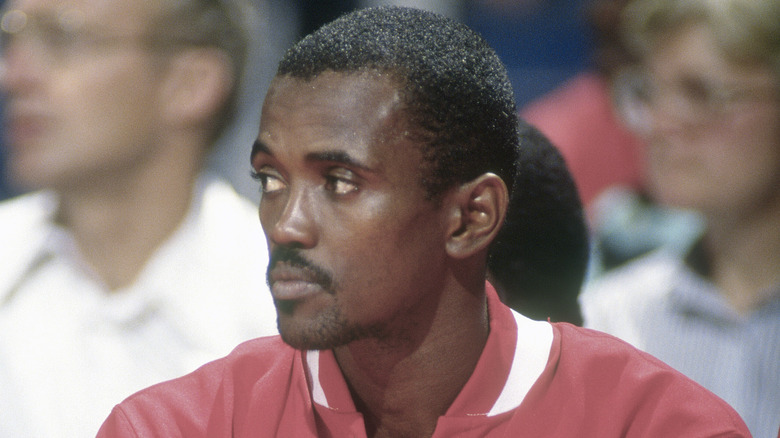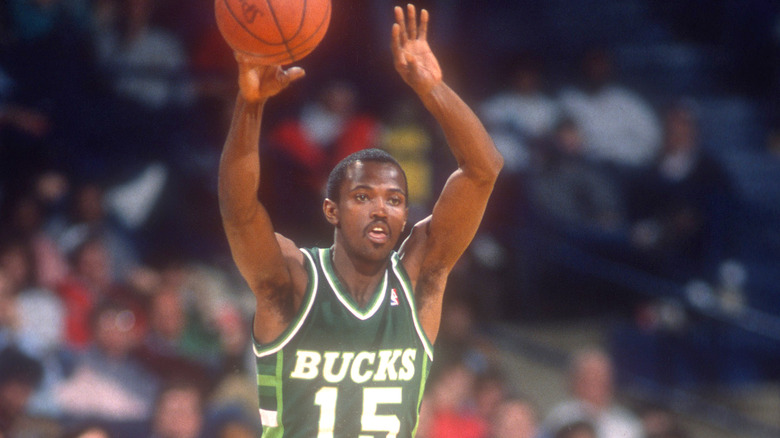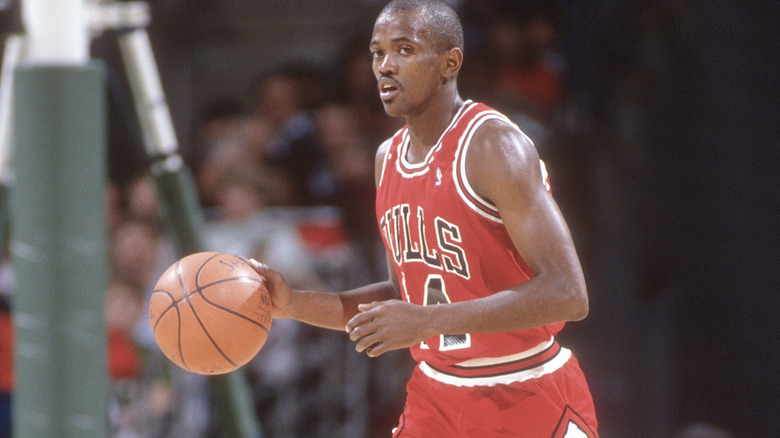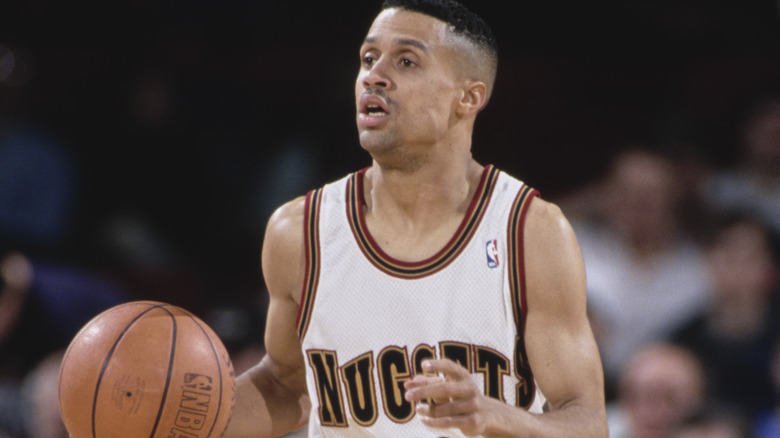How The Chicago Bulls' Craig Hodges Went From NBA Champion To Blacklisted Out Of The Game
While he was never a go-to guy in a similar vein to Chicago Bulls teammates Michael Jordan and Scottie Pippen, combo guard Craig Hodges was an underrated, yet valuable part of the franchise's first few NBA championship teams. Utilized mainly as an offensive spark plug off the bench, Hodges averaged only 5 points in 11.5 minutes per game in the 1990-91 season as the Bulls won their first league title, but with a three-point shooting percentage of 38.3%, he specialized in an aspect of the game that some may consider Jordan's Achilles heel as a player. One year later, Hodges played even fewer minutes, but he still shot 37.5% from beyond the arc and was again an unsung hero on a championship squad.
Soon after the Bulls won the 1992 NBA Finals, Hodges was out of the league, never to return again after playing his last game at the age of 31.
You could say that he was at a point in his career where he was seeing progressively less action, thus potentially making him superfluous whenever the Bulls would reload in the offseason and make small tweaks to Jordan and Pippen's supporting cast. But as NBC Sports pointed out, shooting specialists tend to last longer in the NBA grind, as evidenced by the likes of Dell Curry (Stephen and Seth's dad), who was still a productive bench player when he retired at the age of 37. As it turns out, there was a reason why Hodges didn't get another chance to play in the league after his time with the Bulls was done, and it hits especially close to home some three decades later in the more socially-conscious climate of today.
Hodges' activism allegedly got him blackballed from the NBA
As shown on his Basketball-Reference page (and suggested by the photo above), Craig Hodges enjoyed some success with other teams before joining the Chicago Bulls early in the 1988-89 season; he was, in fact, a two-time league leader in three-point shooting percentage and a regular starter for the Milwaukee Bucks for a few seasons. Theoretically, he could have stuck around for at least a few more seasons after his time in Chicago ended in 1992. But as Hodges later recalled to NBC Sports, he was too vocal about certain social and political issues during the Bulls' White House visit following their 1992 NBA Finals victory. This, he stressed, allegedly led the NBA to blackball him from the league.
"When we won, I had a chance to go to the White House and I presented a letter to President [George H.W.] Bush and asked him to consider our issues like he considered foreign policy," Hodges told the outlet. "And for whatever reason, [after that] I was considered a persona non grata as far as the league was concerned."
Aside from going directly to the president with his concerns, Hodges purportedly rubbed people the wrong way by wearing a dashiki and eschewing the usual suit and tie for the visit. He didn't go into detail to NBC Sports about the issues he raised with Bush, but The New York Times wrote in 1996 that the letter he wrote to the president focused on the injustice African Americans were dealing with at the time. The publication also noted how Hodges had been calling out Black athletes who "failed to use their considerable wealth and influence to assist the poor and disenfranchised.”
The Bulls insisted Hodges was released because he was 'on his last legs as a player'
Shortly after the Chicago Bulls' White House visit, Craig Hodges was released by the team. He told The New York Times in 1996 that he still wanted to try his luck elsewhere in the NBA, but despite how he and his agent had gotten in touch with every team in the league, nobody was willing to give him a chance to try out. That wasn't how the Bulls saw it, as an unnamed team official told the outlet that Hodges was cut "because he was on his last legs as a player."
The official, who spoke to the Times on the condition of anonymity, also emphasized that Hodges' subpar defense was another factor that led to his release. ”He couldn't guard a post, and everyone knew it," they said. For his part, Bulls head coach Phil Jackson acknowledged that Trent Tucker, the player who replaced Hodges as Chicago's new designated long bomber off the bench, was an upgrade. He did, however, say he was surprised that no one even bothered to ask about Hodges after he was cut.
Four years later, Hodges filed a lawsuit against the NBA, alleging that the league blacklisted him ”because of his outspoken political nature as an African-American man.” The lawsuit was later dismissed on account of it being outside the two-year statute of limitations for racial discrimination cases, per the Chicago Reader.
Hodges wasn't the only '90s NBA player whose activism got him in trouble
A few years after Craig Hodges seemingly became a pariah among NBA owners for his activism, another player saw his career unceremoniously abbreviated, and it was also allegedly because of his political beliefs. Mahmoud Abdul-Rauf, previously known as Chris Jackson before he converted to Islam, was the third overall pick in the 1990 NBA Draft and had established himself as one of the league's most promising young point guards by the mid-'90s. Similar to the NFL's Colin Kaepernick two decades later, Abdul-Rauf, then playing for the Denver Nuggets, made headlines in 1996 for his national anthem protests, refusing to stand for "The Star-Spangled Banner" because he "couldn't stand for a flag that represented tyranny and oppression," as he later told Slam Magazine.
During his 2016 interview with Slam, Abdul-Rauf remained steadfast in his beliefs and said he still believes he started seeing reduced minutes because of his protests. However, he stopped short of outright claiming that he was blackballed by the NBA. "You can't just say, 'we're getting rid of him for that'—they had to create an environment where [it was] 'let's change his minutes, and let's mess up his rhythm,'" Abdul-Rauf explained. "A lot of things began to happen, so definitely that's why my career was cut short."



